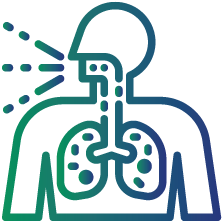
Immunoglobulin IgE (Total IgE) Test
Immunoglobulin IgE (Total IgE)
The total IgE test measures the total amount of immunoglobulin E (IgE) in an individual’s blood. IgE is a type of antibody which are made by the body’s immune system.
Allergies are common, long-term conditions involving your immune system. Your immune system uses antibodies to defend you against bacteria, viruses, and other pathogens that can cause harm. Your immune system misinterprets one or more harmless substances, like pollen or peanuts, as a threat when you have allergies. You might have higher than normal levels of IgE in your blood if you have allergies that cause allergy symptoms.
Thus, getting a total IgE test done is recommended to diagnose immune disorders and specific kinds of infections.
This test is also known as Quantitative IgE, Immunoglobulin E, Total IgE, allergy blood test, IgE allergy test, Specific IgE, RAST (Radioallergosorbent test).
Symptoms of allergy

Difficulty in breathing

Diarrhea

Red patches and rashes

Vomiting

Wheezing

Coughing

Itchy, watery eyes

Stuffy or runny nose
Who should get tested?

If you experience allergy symptoms

If there is a suspicion about a parasitic infection

To evaluate children with allergies who have a family history

To evaluate a case of possible allergic respiratory disease

To confirm food sensitivity in people with cutaneous diseases, angioedema, or asthma

To assess sensitivity to insect venom allergens
Test preparation:
No special preparation is required for the total IgE test.
Interpretation of results
The units of measurement for the results are Kilounits of allergen-specific IgE per liter (kUA/L)
|
Immunoglobulin |
Reference interval (kUA/L) |
|
IgE |
< 64.00 |
Deviation from normal levels indicates the following:
· Total immunoglobulin E (IgE) concentrations may be elevated in a number of clinical diseases, such as allergic disease, some primary immunodeficiencies, infections, inflammatory diseases, and malignancies.
· Increased IgE levels are occasionally linked to parasitic infections.
Consistently elevated total IgE concentrations, along with other required additional tests, can also indicate the diagnosis of allergic bronchopulmonary aspergillosis (a rare allergic reaction to fungus Aspergillus fumigatus)
FAQs
How is the sample collected for an Immunoglobulin IgE (Total IgE) test?
A blood sample is collected from a vein in your arm using a small needle. Usually, this process does not take more than 5 minutes
What are the risks associated with an Immunoglobulin IgE (Total IgE) blood test?
This test involves negligible risk. There might be slight soreness or tenderness around the site where the blood is drawn. Rarely, the site can become infected
What is the turnaround time (TAT) for the Immunoglobulin IgE (Total IgE) test?
Test results of a total IgE-based blood test is usually available on the same day as the sample collection. However, it could take longer at times
When is an Immunoglobulin IgE (Total IgE) test recommended?
In cases of allergy symptoms like itchy skin and eyes, rashes, vomiting, persistent diarrhea, sneezing, coughing, congestion, difficulty breathing, and asthma symptoms like wheezing, breathlessness, coughing, and tightness in the chest, the doctor may recommend a total IgE test
Can an Immunoglobulin IgE (Total IgE) test give false-positive results?
Allergy blood tests may result in false-positive findings in about 50% to 60% of cases. False-positive test results indicate that you are allergic even though you are not. False positives can occasionally occur if your body is slightly reacting to ingredients in certain foods you've recently eaten or tried for the first time

